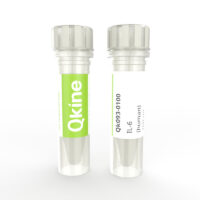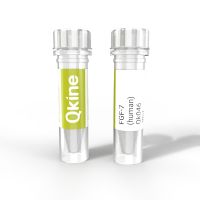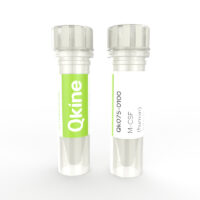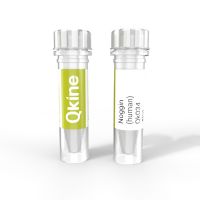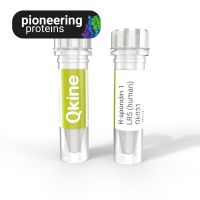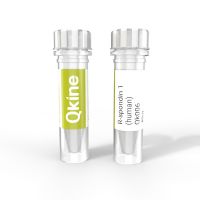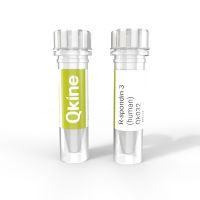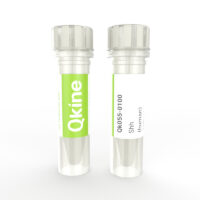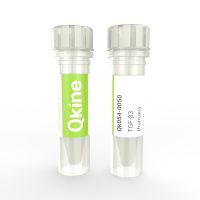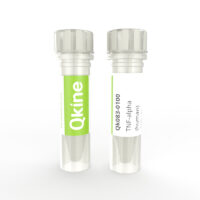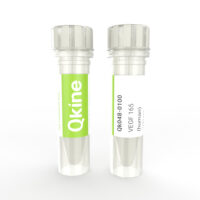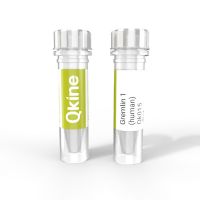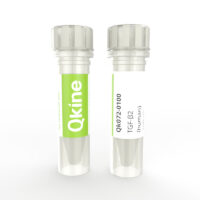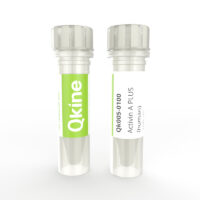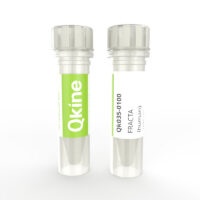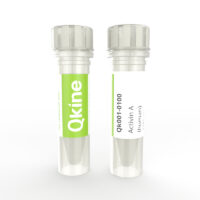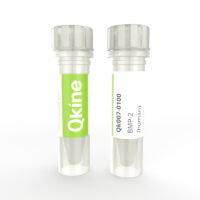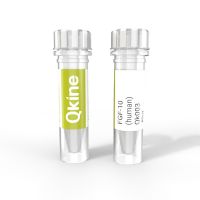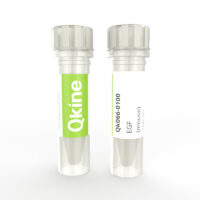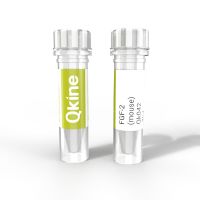- Interleukin-6 (IL-6) is a multifunctional cytokine that regulates immune responses and inflammation. It is produced by various cells, including immune cells such as T cells and macrophages, as well as non-immune cells like fibroblasts and endothelial cells. IL-6 plays a critical role in infection defense and tissue damage by promoting inflammation and activating immune cells. IL-6 is involved in various physiological processes, including the regulation of metabolism, tissue repair, and hematopoiesis. Human IL-6 has a molecular weight of 20.9 kDa. This protein is carrier-free and tag-free to ensure its purity with exceptional lot-to-lot consistency. Interleukin-6 is suitable for the culture of reproducible and high-quality hematopoietic stem cells and other relevant cells.
- Human KGF protein (FGF-7) is a member of the FGF family secreted by mesenchymal cells and has a paracrine effect on neighbouring epithelial cells.1 KGF protein is used in the culture of lung, breast, liver, and bladder organoids.2 In vivo, KGF is involved in wound healing and development of kidney, thymus, and hippocampus.1High purity and bioactivity 19 kDa human FGF-7 / KGF protein, animal-origin free (AOF) and carrier-protein free (CF).
- Macrophage colony-stimulating factor (M-CSF) is a cytokine that regulates the survival, proliferation, differentiation, and functional activation of monocytes, such as macrophages and dendritic cells. Various cells produce and release M-CSF, such as endothelial cells, fibroblasts, osteoblasts, smooth muscle, and macrophages. M-CSF binds to the CSF-1 receptor (CSF-1R) leading to the activation of the PI3K-AKT and AMPK signaling.M-CSF has been used in vitro for the differentiation of human induced pluripotent stem cell (iPSC)-derived macrophages as well as the maintenance and development of monocytes in hematopoietic stem cell culture. M-CSF has also been used to influence macrophage polarization towards an anti-inflammatory or M2 macrophage phenotype.A highly bioactive, animal-origin-free (AOF), carrier protein-free 36.8 kDa recombinant protein with exceptional lot-to-lot consistency.
- Human noggin is a bone morphogenetic protein (BMP) family antagonist used in the culture of intestinal, pancreatic, lung and tumor-derived organoids, maintenance of undifferentiated embryonic stem cells and for stem cell differentiation into neural and microglial lineages.Qkine human noggin protein is a highly pure 46kDa bioactive dimer for reproducible results in organoid culture.
- Recombinant human r-spondin 1 LR5 protein is engineered to act as a high affinity ligand for the LGR5 receptor. In epithelial tissues LGR5 marks the stem cell population. This engineered protein, R-spondin 1 LR5, activates wnt signalling only in the LGR5+ stem cell population. R-spondin1 LR5 has been tested in intestinal organoid culture and supports organoid survival and growth. As LGR5 specifically marks stem cells and is not found on transit amplifying cells, the lower crypt multiplicity seen in organoid cultures with R-spondin 1 LR5 (in comparison to wild-type R-spondin 1, Qk006) supports the notion that this engineered form is acting specifically on stem cells. This specialized form of R-spondin 1 was developed in Marc de la Roche’s lab (University of Cambridge).
- R-spondin 1 protein (RSPO1) is the prototypic member of the R-spondin family and is used to potentiate Wnt signaling in many organoid culture systems including intestinal and tumor (cancer) organoid culture. R-spondin 1 is also required for hematopoietic stem cell specification and cancer cell migration and survival.Recombinant human R-spondin 1 protein (RSPO1) protein is the bioactive domain of human R-spondin 1 comprising the two cysteine-rich furin-like domains of R-spondin 1. Those are necessary and sufficient for Wnt signaling potentiation and are the essential domains for activity in stem cell and organoid culture.This protein has a molecular weight of 13 kDa and is animal-free, carrier protein-free, and tag-free to ensure its purity with exceptional lot-to-lot consistency. Qk006 is suitable to replace R-spondin conditioned media for improved reproducibility in chemically defined organoid culture media.
- Human R-spondin 3 protein potentiates Wnt signalling in and has been shown to function in crypt regeneration in the intestine and control stem cell and progenitor cell behaviour during kidney development. R-spondin 3 is used alongside R-spondin 1 in intestinal organoid culture systems.17kDa highly pure, bioactive domain of human R-spondin 3 comprising the two cysteine-rich furin-like domains, which are necessary and sufficient for Wnt signalling potentiation and are the essential domains for activity in stem cell and organoid culture. Animal-free and carrier-protein free.
- Sonic hedgehog protein (Shh) is a member of the Hedgehog family with an essential role in embryonic development, tissue regeneration, and tumorigenesis. Shh induces the cell fate and patterning of neural progenitors in ventral domains at various levels in the forebrain, midbrain, hindbrain, and spinal cord. It has many applications in the neural stem cell field where it plays a significant role in differentiating human-induced pluripotent stem cells (iPSC) towards motor neurons and interneurons. Also, it induces the patterning of organoids and embryos in culture.Recombinant Shh protein has a molecular weight of 19.8kDa. This protein is animal-free (AOF), carrier protein-free, and tag-free to ensure its purity with exceptional lot-to-lot consistency. Sonic hedgehog protein is suitable for the culture of reproducible and high-quality neurons and organoids.
- Human TGF-β3 protein is a member of the Transforming Growth Factor family, a family involved in regulating cell survival, proliferation and differentiation.1 TGF-β3 is used in human pluripotent stem cell maintenance medias, such as B8 media.2 High purity and bioactivity for reproducible results. Human TGF-β3 protein dimer, animal-origin free (AOF) and carrier-protein free (CF).
- Tumor necrosis factor-alpha (TNF-α) is a cytokine involved in cell signaling, primarily produced by immune cells like macrophages. It plays a central role in inflammation, immunity, and regulating cell survival and death. TNF-α binds to its receptors, TNF receptor 1 and TNF receptor 2, triggering pro-inflammatory responses, apoptosis, and immune cell activation.Human TNF-α has a molecular weight of 17.3 kDa. This protein is carrier-free and protein tag-free to ensure its purity with exceptional lot-to-lot consistency. Qk083 TNF-alpha is suitable for the culture of reproducible and high-quality hematopoietic stem cells and other relevant cells.
- Recombinant human vascular endothelial growth factor 165 (also known as VEGF165/ VEGF-165/ VEGF-A/ VEGF165) protein is widely used in culturing primary endothelial cells, such as human umbilical vein endothelial cells.VEGF165 is commonly used with human-induced pluripotent stem cells or embryonic stem cells-derived endothelial cells for developing human vascular tissue models. It has many applications including its use in neural research involving oligodendrocyte precursor cells, Schwann cells, astrocytes, and microglia. It plays a role in bone formation, regulates mesenchymal stem cell differentiation, and serves as a survival factor for chondrocytes, hematopoietic stem cells, and tumor cells.Qkine recombinant human VEGF165 protein is a highly pure and potent 38 kDa homodimer, disulfide-linked consisting of two 165 amino acid polypeptide chains. It is an animal origin free (AOF) and carrier protein-free (CF) isoform of VEGF for high efficiency.
- Human/bovine/porcine Gremlin 1 protein is a BMP-inhibitor present in the natural intestinal niche and provides an alternative to Noggin for optimisation of intestinal organoid culture and iPSC differentiation.Qk015 has been optimized by our experts for exceptionally high-purity production in E.coli and bioactivity. 18 kDa high purity dimeric protein, animal-free and carrier protein free
- Transforming Growth Factor beta 2 (TGF-β2), part of the TGF-β superfamily, regulates a wide array of cellular processes, including proliferation, differentiation, wound healing, apoptosis, metabolism, embryogenesis, and tissue repair. It is an essential growth factor in many embryonic and induced pluripotent stem cell culture media.In cell culture, TGF-beta 2 is crucial for directing cell fate, especially in stem cells and differentiation and facilitating wound healing processes. As a modulator of immune responses and a factor in tumour development, TGF-β2's involvement extends to immunomodulation and interaction within the tumour microenvironment. Its other applications in cell culture include stimulating protein expression and secretion. Overall, TGF-beta 2 emerges as a key player in cellular regulation with diverse biological functions.TGF-beta 2 is a high purity protein with a molecular weight of 25.4 kDa. This protein is carrier-free and tag-free to ensure its purity with exceptional lot-to-lot consistency. Qkine TGF-beta 2 is suitable for the culture of reproducible and high-quality stem cells and other relevant cells.
- Human/mouse/rat Activin A PLUS ™ protein is an optimised biologically active truncation of the mature domain of human Activin A protein. The EC50 and activity in stem cell culture of activin A PLUS is equivalent to the full mature domain activin A.High purity 24 kDa dimer comprising truncated mature domain of activin A protein, animal-free (AF) and carrier-protein free (CF). Recombinant Activin A PLUS is designed to be manufactured at scale for cost-effective, large-scale stem cell culture applications.
- Follistatin-resistant activin A protein (FRACTA) has been engineered to prevent binding to the natural inhibitor, follistatin. Activin A activity protein is regulated in vivo by follistatin, a high-affinity inhibitor; follistatin accumulates in stem cell culture, where it inhibits activin A.Qk035 follistatin-resistant activin A protein (FRACTA) has equivalent bioactivity to wild-type activin A (Qk001) but does not bind follistatin so is resistant to feedback inhibition. High purity 26 kDa dimer comprising engineered mature domain of activin A protein, animal-free (AF) and carrier-protein free (CF). This specialised activin A has been developed in Marko Hyvönen’s group in the University of Cambridge.
- Activin A is a TGF-β family growth factor regulating embryonic development, cell proliferation, differentiation, and immune responses. Activin A is frequently used to maintain pluripotency in induced pluripotent and embryonic stem cell cultures. It is also used in many stem cell differentiation protocols, including endoderm lineage differentiation and further maturation into hepatocyte and pancreatic cells. Recombinant human/mouse/rat/bovine/porcine activin A protein is a high-purity mature bioactive dimer of 26 kDa. It is animal-free, carrier protein-free, and tag-free to ensure its purity with exceptional lot-to-lot consistency. This protein has been rigorously benchmarked against other commercial sources and extensively validated for highly reproducible stem cell culture. Qkine founder Marko Hyvönen developed the protocol for making high-purity activin A, and this protein is used at the Cambridge Stem Cell Institute. High purity mature bioactive dimer. Animal-free (AOF) and carrier-protein free (CF). Rigorously benchmarked against other commercial sources.
- Human/mouse/rat/bovine/porcine BMP-2 protein (bone morphogenetic protein 2) protein is member of the TGFβ family and a key regulator of embryogenesis and potent differentiation factor of embryonic stem cells (ESC) and induced pluripotent stem cells (iPSC) towards endoderm fates. BMP-2 plays roles in the differentiation of mesenchymal cells to adipocytes, epithelial cancer EMT, chondrogenesis and regulation of neuronal and glial cell development.26 kDa disulfide–linked bioactive highly pure dimer comprised of the mature domain of human BMP-2 protein. Animal-free (AOF) and carrier protein-free.
- Human/rat/porcine/bovine FGF10 protein promotes lung organoid formation and induces branching morphology. FGF10 protein is used widely in organoid culture, embryonic stem cell (ESC) and induced-pluripotent stem cell (iPSC) differentiation, and for the study of epithelial to mesenchymal transition and tumor metastasis.High purity and bioactivity 17 kDa, bioactive domain of human fibroblast growth factor 10, animal-free (AOF) and carrier-protein free (CF).
- Epidermal growth factor (EGF), a member of the EGF family of proteins, plays a significant role in regulating cellular processes such as cell growth, proliferation, differentiation, development, and tissue homeostasis. It is an essential growth factor in many stem cells and organoid culture media.In cell culture, mouse EGF is crucial for stem cell maintenance, proliferation, differentiation, organoid culture growth and survival. It is also widely used for disease modelling, drug screening, tissue engineering, and regenerative medicine. Overall, EGF is a key player in cellular regulation and functions.Mouse EGF is a high purity protein with a molecular weight of 6.1 kDA. This protein is carrier-free and tag-free to ensure its purity with exceptional lot-to-lot consistency. Qkine mouse EGF is suitable for the culture of reproducible and high-quality stem cells and various tissue-specific organoids.
- Recombinant mouse FGF2 protein/ bFGF is an important factor in the maintenance of mouse epiblast-derived stem cells (EpiSC). Mouse naïve pluripotency is maintained by LIF, BMP4, and Wnt signalling pathways. However, the primed state of pluripotency in mouse EpiSCs is more similar to hESC and hiPSC, being maintained by FGF2 and TGFβ/Activin/Nodal pathways.1,2High purity and bioactivity 16 kDa murine bFGF / FGF2 (basic FGF) protein, animal-origin free (AOF) and carrier-protein free (CF).
